
If you’re an 18-to-25-year-old still trying to figure out what to do with your life—welcome to the club! You are exactly where 99% of people your age are: floating between “I want to follow my passion” and “I also don’t want to be broke.”
So, let’s talk about a career in Sports Management—a magical land where you think you’ll be besties with Virat Kohli, but in reality - you’ll be running around organizing events while eating a cold vada pav in the stadium parking lot.
Sounds fun, right?
Here is a 10-Steps guide to turn your passion into a Career
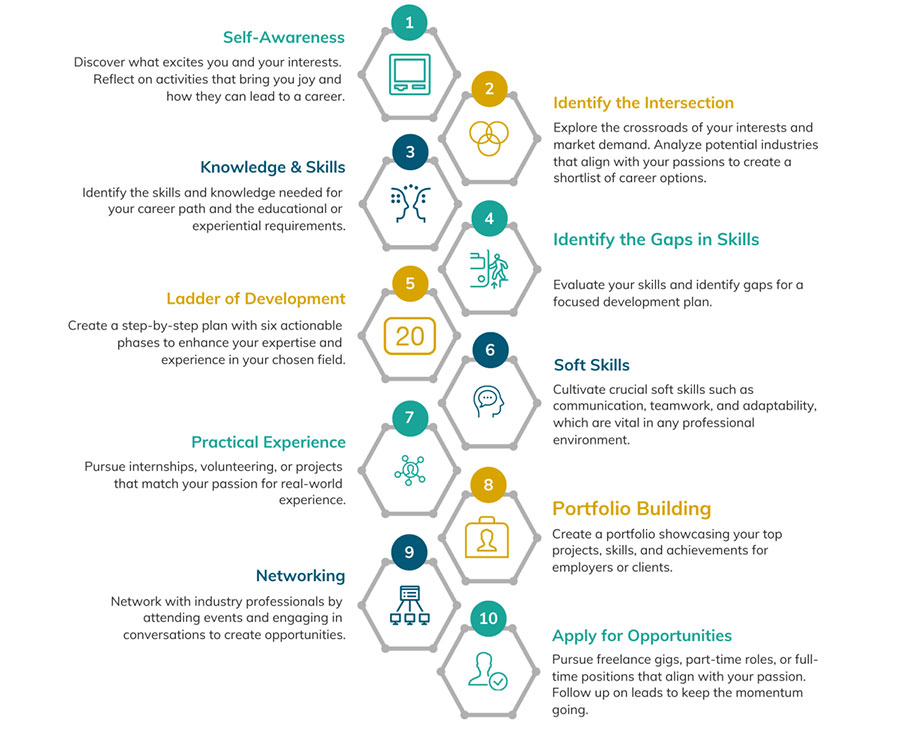
I see you eyeing this infographic like a gym membership—excited but ready to quit before the real work starts.
Read on, champ! The fun (and the career success) is in the details.
Let’s break it down!
Step 1: " The “Kya Karna Hai Life Mein” Phase also called The Self Awareness Phase
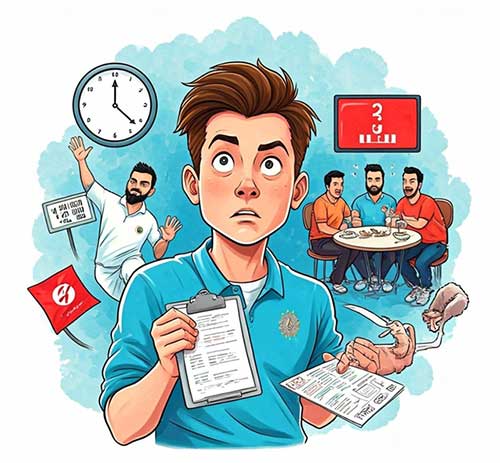
Congratulations! You’ve reached the self-awareness step in your career journey. This is where you sit down, stare at your ceiling, and ask yourself:
"What do I actually want to do with my life?"
If your brain immediately responds with: No clue, bro! Mummy ne bola Management karo! Can I make money watching IPL?
Then, good news! You are not alone. 99.9999% of students feel this way. (The other 0.0001% were born knowing they wanted to be Scientist)
Now, let’s fix this career confusion.
How?
By answering three simple questions:
(And no, "free food at weddings" doesn’t count.)
Think about it—what makes you jump out of bed in the morning? (Besides an electricity cut during summer.)
• Do you love organizing things? (Like convincing 10 friends to split a Zomato order without fighting?)
• Do you enjoy analyzing sports? (Like explaining why CSK is actually better than MI, backed with stats?)
• Do you naturally take charge? (Like forcing your colony’s cricket team to do fitness drills?)
If yes to any of these, you might just belong in Sports Management.
Look at your current course. Does it make you think:
• "Wow, I love this!" (Congrats! You are one of the rare lucky ones.)
• "It’s okay but not thrilling." (Maybe tweak your career path slightly.)
• "Bro, I have no idea why I’m even in this course." (Time to explore better options.)
Warning: If you have already chosen BCom, BAMS, or BSc, and thought, "Wait, I don’t actually want to be an accountant, doctor, or scientist!" —
Take a deep breath. It’s fine. No one expects you to have life figured out at 20. (Even 40-year-olds don’t.)
This is why we move to the next step.
This is where you narrow things down instead of just randomly Googling "highest paying jobs 2025".
Step 1: Pick 3-4 career options that actually seem interesting. (Yes, picking ‘Full-time Netflix Viewer’ is not allowed.)
For example:
• If you like business + sports, try Sports Management.
• If you enjoy marketing, look into sports sponsorships.
• If you’re into data + sports, consider sports analytics.
You don’t need to have the exact career choice today. Just a shortlist is enough. You can refine it over time.
TL;DR (Too Long; Didn’t Read)
1. If you’re confused about your career, you’re normal. Relax.
2. Think about what excites you. (Besides eating biryani.)
3. Identify subjects you actually enjoy (or at least don’t hate).
4. Pick 3-4 potential career paths that interest you.
5. If sport excites you, Sports Management might just be the perfect fit.
Final Thought:
If this step felt overwhelming and you’re still unsure, don’t worry. Figuring out your career is like trying to decide what to watch on Netflix—it takes time, exploration, and some trial and error.
Now, on to Step 2, where we answer the burning question:
“Will my current degree get me a job?” (Spoiler: Probably not.)
(Stay tuned.)
Step 2: Are You in This for the Right Reasons?

So, you’re thinking about Sports Management as a career? Awesome! But before you start daydreaming about chilling with athletes and VIP passes to the IPL, let’s have a little reality check.
Because here’s the thing: Loving sports ≠ Being good at sports management.
Just like loving eating food doesn’t make you a great chef, and watching Shark Tank doesn’t mean you’re the next startup billionaire.
The “Wrong” Reasons to Choose Sports Management
“Bro, I love cricket. This should be easy.” (Wrong. You’ll be managing sponsorship reports, not hitting sixes in Wankhede.)
“I will become besties with Virat Kohli.” (Nope. You’ll be besties with Excel sheets and event timelines.)
“I will get free match tickets and VIP access.”
(HAHA. Your VIP pass is a volunteer T-shirt and unlimited stress.)
The “Right” Reasons to Choose Sports Management
• You love organizing events. (Your college fest? That cricket tournament in your society? That counts!)
• You enjoy the business side of sports. (Marketing, sponsorships, fan engagement—this is where the real money is!)
• You’re cool with working behind the scenes. (Because someone needs to make sure the halftime show doesn’t turn into a disaster.)
• You understand that this career is about SKILLS, not just passion. (If “passion” was enough, every football fan would be running FIFA by now.)
The “Sports Glamour Trap” (Don’t Fall for It!)
A lot of people think working in sports is just watching matches, hanging with celebs, and chilling in luxury boxes.
Reality?
• You’ll be managing the chaos of sponsorships, logistics, and marketing.
• You’ll be at the stadium at 6 AM ensuring the event runs smoothly.
• You’ll be the one fixing last-minute disasters
(“The DJ didn’t show up, the scoreboard crashed, and the mascot costume is missing—fix it NOW!”).
• You’re not the consumer of sports. You’re the one making it happen.
(Think of yourself as the chef, not the customer at the restaurant.)
“Wait… Do I Need to Be an Athlete to Work in Sports?”
NOPE!
You don’t need to have played for India. You don’t even need to have played for your colony’s gully cricket team.
What matters? Your ability to manage, market, and grow the business of sports.
In fact, some of the biggest names in sports management have never played professionally. (Imagine if football clubs only hired ex-players—half the marketing teams would be useless!)
TL;DR (Too Long, Didn’t Read)
1. If you think sports management = hanging with athletes, you’re in for a shock.
2. Passion is great, but skills + knowledge = success.
3. You don’t need to be an athlete to make it big in this field.
4. If you love marketing, sponsorships, event planning, or operations, this career might be perfect for you.
Final Thought:
If you’re still here after this reality check, congratulations! You might actually be cut out for this industry.
But before you get too excited, let’s move to Step 3—where we answer:
“Will my current degree get me a job?” (Spoiler: Probably not, but don’t panic yet! )
Before Step 3: "Will My Degree Get Me a Job?" – Spoiler Alert: Probably Not. But Keep Reading.
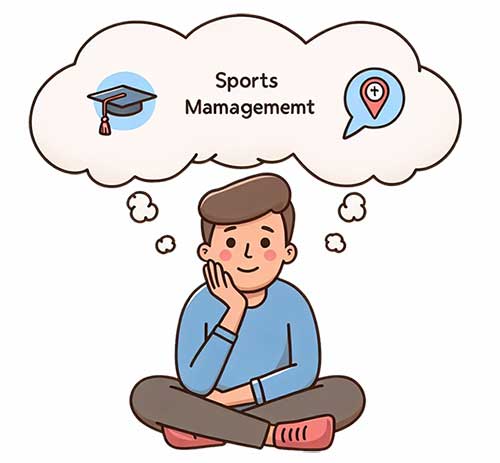
Ah, the classic question every student asks at some point:
"Can I land a job in sports management with my current degree, or am I just collecting degrees like Pokémon cards?"
Let’s break this down honestly (and with minimal heartbreak).
The Harsh Truth: Your Degree Alone Won’t Get You Hired
Whether you have a BCom, BAMS, BE, or even a PhD in Watching Sports on TV—a degree alone won’t magically open doors.
Employers don’t hire based on degrees. They hire based on skills and experience (which, unfortunately, are not included in your college syllabus).
So, if you’re waiting for recruiters to show up at your doorstep just because you have a piece of paper that says "Graduate"—you’re going to be waiting longer than RCB fans waiting for an IPL trophy.
"Have I Missed the Boat?" (No. But Stop Waiting for It.)
A lot of students panic thinking, "Am I too late to enter sports management?"
Short answer: No.
Long answer: No, but you need to get moving.
This is not an industry where only people who started young succeed. It’s an industry where the ones who take action, build skills, and gain experience get ahead—regardless of when they start.
So no, you haven’t missed the boat. But if you keep waiting instead of taking action, you’ll miss it soon.
"Okay, But What Do Employers Actually Want?"
Glad you asked. Let’s look at what gets people hired in sports management:
• Sports Marketing → Skills in social media, digital marketing, sponsorships, branding.
• Event Management → Experience in organizing events (yes, even your college fest counts!).
• Sponsorship & Sales → Ability to pitch, negotiate, and close deals.
• Sports Operations → Logistics, scheduling, team management, and execution.
• Content Creation → Copywriting, video editing, social media engagement.
Notice a pattern?
It’s not about what degree you have. It’s about what you can actually do.
"But I Didn't Study Sports Management… Am I Doomed?"
NOPE!
Good news: You don’t need a sports management degree to break into the industry. Bad news: You do need skills and practical experience.
Even if you have a BCom, BA, BSc, or even an MBBS (okay, that’s rare, but who knows?)—you can still make it.
If you’ve helped organize a college event, managed a sports club, run a social media page, or even sold T-shirts at a local marathon—guess what? That’s experience.
The key is to start gaining experience NOW, wherever you can.
So… Can I Get a Job with My Degree?
Let’s recap:
If you’re relying only on your degree—NO. If you’re actively building skills, gaining experience, and networking—YES.
Your degree is just a foundation. What you do next is what makes the difference.
So, don’t wait for a job to come to you—start creating opportunities!
Final Thought:
If you’re still here, congratulations! You’ve made it past the “Waiting for a Job” phase and are ready for the “Time to Take Action” phase.
Now, let’s move to Step 3, where we dive into:
"What skills do I actually need, and how do I start learning them?"
(Hint: It’s NOT by binge-watching HOTSTAR all day)
Step 3: What Skills Do You Actually Need? (A.K.A. Time to Stop Daydreaming and Start Learning!)
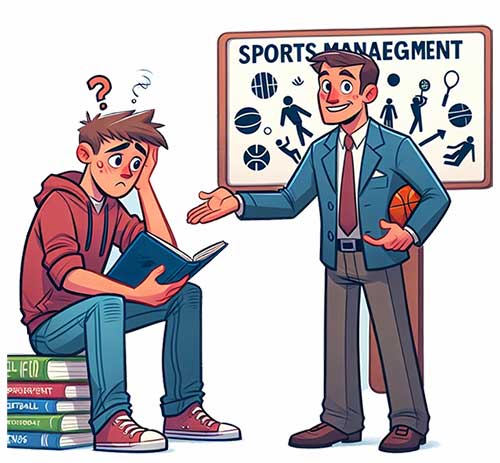
So, you’ve made it past Step 1 (What am I doing with my life?) and Step 2 (Am I here for the right reasons?).
And now you’re thinking:
"Okay, okay—I get it. I need skills. But WHICH ones? And HOW do I get them?"
Don’t worry, I got you. Let’s break this down, step by step—fun, painless, and brutally honest.
Before we go any further, let’s be real:
You can’t just pick "Sports Marketing" because it sounds cool
You can’t just choose "Sports Analytics" because you like numbers sometimes. You can’t just say "Athlete Management" because you think you'll manage the next Lionel Messi.
You need to identify what you’re actually good at—or at least, what you might be good at if you tried.
Rate yourself on a scale of 1-5: (Be honest. Lying here helps no one—except maybe your ego.)
• Event Planning & Logistics – Can you plan events without turning them into disasters?
• Marketing & Promotions – Can you convince people to do things without sounding like a scam?
• Networking & Communication – Can you talk to people without making it awkward?
• Sponsorship & Sales – Can you sell something (besides kidney jokes)?
• Content Creation – Are you good at videos, blogs, memes, or editing?
• Data & Analytics – Do you enjoy stats, spreadsheets, and analyzing performance?
If you scored:
• 1-2 in everything: Uh-oh. Time to start learning fast.
• 3-4 in a few: Solid! Pick those areas and start improving.
• 5 in anything: Nice! This could be your domain
Once you sort of know what you’re good at (or what doesn’t make you want to run away), pick a domain.
Think of it like this:
• If you love planning & execution → Event Management
• If you love marketing & branding → Sports Marketing / Sponsorships
• If you love talking & convincing people → Sponsorship Sales
• If you love making content → Social Media / Broadcasting & Media
• If you love numbers & stats → Sports Analytics
• If you love working with athletes → Athlete Management
Pro Tip:
Now that you’ve narrowed it down, let’s talk about what you actually need to learn.
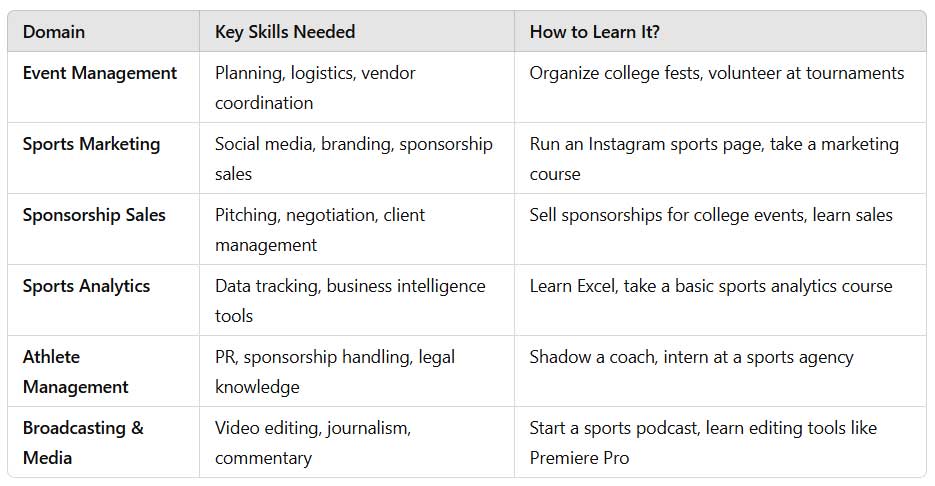
IMPORTANT: If your plan is just “I’ll learn on my own… someday”, you won’t make it. Start NOW. Even if it’s just watching YouTube tutorials, doing free online courses, or volunteering at a small event—DO SOMETHING.
Final Thoughts:
Skills Over Everything
• If you don’t know your strengths yet → Try different things and see what sticks.
• If you already know your strengths → Pick a domain and start mastering it.
• If you’re waiting for someone to “teach” you everything → Sorry, that’s not how this works.
Learn by DOING. Be a Krit — a Doer. (The Sanskrit word "Krit" (कृत) means "The Doer"—one who takes action, creates, and accomplishes. And that’s exactly what you need to be in sports management.)
Up Next: Now that you know what to learn, the next question is:
"Should I do a Sports Management course, or can I just learn everything on my own?"
(Step 4 answers that. Stay tuned.)
Step 4: The “Oh No, I Have a Skill Gap” Moment
Alright, reality check time.
You’ve figured out: What you’re interested in.
What you might be good at. What skills you need for a career in sports management.And now, it’s time for the brutal truth.
You probably don’t have those skills yet. (Ouch. But don’t worry, neither does anyone else at the start!)
This is your "Skill Gap" moment—where you compare what you have vs. what you need to actually get hired.
Step 1: The Self-Check Test (How Big is Your Skill Gap?)
Quick Exercise: Rate yourself from 1 to 5 in each skill. Be honest

Reality Check:
• If you rated yourself 4-5 in a skill → You’re in good shape!
• If you rated yourself 1-3 → We have some work to do, my friend.
Step 2: What’s Your Learning Path? (Course vs. DIY)
Now that you know your gaps, the next question is:
"How do I fill these gaps?"
You have two paths:
1. Do a structured Sports Management Course (Good if you want structured learning, internships, networking, and guidance.)
2. DIY Learning (Self-Study & Practical Experience) (Good if you’re disciplined and can hustle to learn on your own.)
Quick Guide:

Step 3: The "What Now?" Moment
Now that you know your gaps, it’s time to:
• Start learning (through a course, self-study, or real-world experience).
• Get hands-on experience (volunteer, intern, create your own projects).
• Keep improving (because learning never stops in sports).
Next up: The 6-Step Ladder to Skill Development (A.K.A. How to Level Up in Sports Management).
(Step 5 coming soon!)
Step 5: The 6-Step Ladder to Becoming a Sports Management Pro (A.K.A. How to Actually Get Good at This)
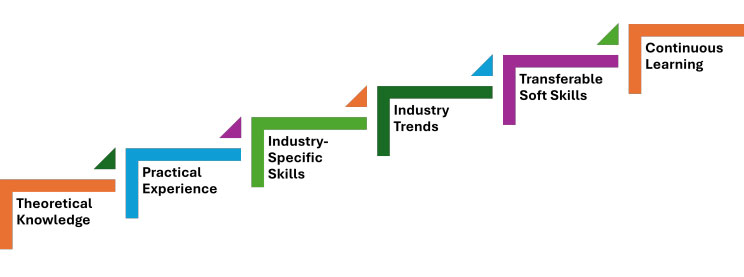
Alright, so now you know your gaps (ouch), and you’re probably thinking:
"Okay, I get it—I need skills. But how do I actually develop them without waiting 5 years?"
Great question! The answer? Climb the “Ladder of Knowledge & Skills” step by step.
Yes, my friend. This is not a Bollywood movie where you magically go from clueless intern to CEO in one song montage. You’ve got to put in the work.
Step 1: Theoretical Knowledge (A.K.A. Stop Watching Reels & Start Learning)
Before you start running around managing sports events like a pro, you need some actual knowledge. (And no, “I watch every IPL match” is not real knowledge.)
What to do?
• Take online courses (yes, actual learning, not just random YouTube shorts).
• Read sports business books & industry reports (Not just cricbuzz, my friend.).
• Google like your life depends on it: "How does sponsorship work in sports?" "What is fan engagement?"
Reality Check:
If you’re not willing to learn the basics, how will you explain sponsorship deals when someone asks? (You can’t just say "Sir, sports is emotional" and walk away.)
Step 2: Practical Experience (A.K.A. Time to Get Your Hands Dirty)
Now that you’ve read a few things, it’s time to actually DO something.
Where to start?
• Volunteer at college sports fests, marathons, and local tournaments.
• Apply for internships with sports organizations (Even if it’s unpaid at first—experience > ego).
• Work on live projects (Yes, even organizing a society football match counts!).
Harsh Truth: If you keep waiting for a “perfect” opportunity, you’ll still be waiting in 2030.
Step 3: Industry-Specific Skills
Now that you have basic experience, it’s time to level up with specific skills.
What should you learn?
• Sports Marketing & Sponsorships → Learn brand activation, digital marketing, and sales strategies.
• Event Operations → Understand logistics, budgeting, ticketing, and scheduling (Yes, Excel sheets will become your new best friend).
• Fan Experience → Study what makes a great matchday experience (Go to live games and observe).
Pro Tip:
Every skill you add = More money, more job opportunities, and more chances to avoid becoming the “coffee-fetching intern.”
Step 4: Industry Trends (A.K.A. Don’t Become a Dinosaur)
Sports is evolving FAST—if you don’t keep up, you’ll be left behind like a 2012 Nokia phone.
What to do?
• Learn how AI, blockchain, and digital media are changing sports.
• Take short-term certifications in sports analytics, sports law, or emerging tech.
• Stay updated on how brands and leagues are adapting to new trends.
Think about it: If someone asks "What do you think about AI in fan engagement?" and your answer is "Uhh…", you’re already behind.
Step 5: Transferable Soft Skills (A.K.A. Learn How to Talk Like a Pro)
I don’t care how many skills you have—if you can’t communicate well, you won’t get hired.
What to improve?
• Verbal & written communication (Because "Sir, pls internship" is NOT how you send an email).
• Networking & relationship building (Your LinkedIn should be a goldmine, not a ghost town).
• Analytical thinking (Numbers don’t lie—learn how to interpret sports data!).
Harsh Reality: A lot of people are smart, but not everyone can explain their ideas well. If you master this, you’re already ahead.
Step 6: Continuous Learning (A.K.A. Never Stop Growing)
If you think learning stops after your first job, you’re in for a rude shock.
How to stay sharp?
• Follow sports business websites (Not just sports gossip pages!).
• Listen to sports industry podcasts while traveling (Instead of 3-hour YouTube roasts).
• Keep an eye on emerging trends (because the industry changes FAST).
Fun Fact:
The people who stay updated & adapt are the ones who become leaders. The rest? They just complain about "lack of opportunities."
Final Thought:
The Shortcut = There Is No Shortcut
If you were hoping for some magic trick to become successful overnight… sorry to disappoint.
Your simple game plan:
1. Learn the basics.
2. Get hands-on experience.
3. Master specialized skills.
4. Stay updated with trends.
5. Improve your communication & networking
6. Keep learning, always.
This isn’t a quick process—but if you keep climbing the Ladder of Knowledge & Skills, you WILL get there.
Next Up: Step 6 – Soft Skills (A.K.A. How to Not Sound Clueless in a Meeting).
Stay tuned!
Step 6: Soft Skills – Just as Important as Knowing Your Job!
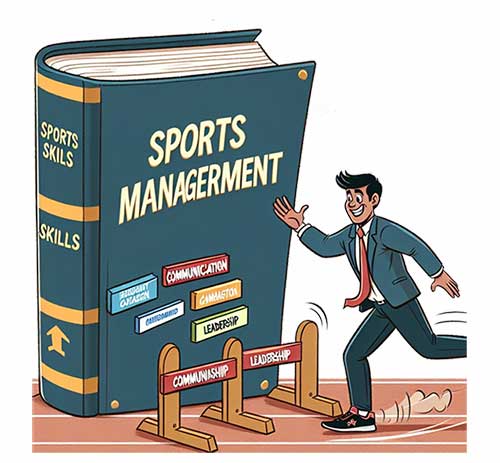
So, you’ve got technical skills? Great. But if you can’t communicate properly, meet deadlines, or work in a team, you’ll crash faster than a WiFi signal during a live stream.
Soft skills aren’t optional. They’re the difference between: Being the MVP of your team vs. Being the guy who gets ignored in group chats.
And here’s the good news: You don’t need to wait for an internship or job to master them.
Make them habits. Start now.
Let’s Look at Some Key Soft Skills (With Real-Life Sports Situations)
1. Work Ethic – Say It, Do It
[NO] If you promise to send a report at 5 PM, don’t send it at "Sorry sir, WiFi issue." Sports events are fast-paced—flaky people don’t survive here.
Lesson: Your word = your credibility.
2. Time Management – Deadlines Are NOT Suggestions.
[NO] 6 AM briefing ≠ "Sir, I thought 6 AM was flexible." 6 AM briefing = Arrive at 5:55 AM, be prepared.
Lesson: Be on time, or be out.
3. Communication & Networking – No, “Bro, Pls Job” is NOT Networking.
[NO] Sending “Sir, I love sports. Pls hire me” ≠ Networking. Following up after meetings with a short, smart message = Networking.
Lesson: Talk well, write better, build relationships = Opportunities.
4. Focus & Consistency – Stop Starting, Start Finishing.
[NO] “I read one sports marketing case study, I’m an expert now.”
Make learning a daily habit. Keep analyzing deals, trends, and sponsorships.
Lesson: One-off efforts won’t make you an expert. Daily progress will.
5. Problem-Solving & Adaptability – Because Nothing Ever Goes As Planned.
[NO] “The venue changed last minute! PANIC!” [NO] Find a solution, not an excuse.
Lesson: In sports, things WILL go wrong. Be the person who fixes them.
6. Leadership & Teamwork – Be a Team Player, Not an Annoying Solo Star.
[NO] “I did everything, I take all credit.” Support teammates, collaborate, and step up when needed.
Lesson: No one likes a know-it-all. Be reliable, adaptable, and easy to work with.
Soft Skills Playbook (A.K.A. Your Cheat Code for Success)
Master these key habits now, and you won’t just get jobs—you’ll dominate the industry.
Next Up: Step 7 – Internships & Volunteering (A.K.A. How to Get Experience When No One Wants to Hire You).
Stay tuned!
Step 7: Internships & Volunteering – Because Watching Sports Won’t Get You a Job

So, you want to work in sports management? Great! But here’s the thing—no one will hire you just because you “love sports.” You need practical experience to prove you can actually do the job.
Not All Internships Are Created Equal
Skill-Based Internships:
• You actually learn something useful (marketing, sponsorship sales, event operations).
• You gain hands-on experience that makes you valuable.
Non-Skill-Based Internships:
• You spend 3 months handing out flyers at an event.
• The only thing you learn is how to survive on free biscuits from the office pantry.
Moral of the story?
Choose wisely. A big-name event means nothing if you’re just a T-shirt counter.
What If No One Gives You an Internship?
Simple: Create your own opportunity.
• Join your college sports committee – You want experience? Start where you are. Organize a local event – Plan a cricket tournament, esports competition, or a neighbourhood marathon.
• Become an “Intern-Preneur” – Take charge of sponsorships, marketing, logistics, and make it a real project.
Imagine applying for a job and saying: "I didn’t wait for an opportunity—I created my own tournament, marketed it, got sponsors, and managed the event."
That’s 10x more impressive than just being a volunteer at a high-profile event with no real responsibilities.
The sports industry is fast, competitive, and full of people waiting for a lucky break. But success doesn’t come to those who wait—it comes to those who DO. So don’t sit around hoping for an opportunity.
Be a Krit. Create your own. Employers love problem-solvers, not excuse-makers.
In Sanskrit, "Krit" (कृत) means "The Doer"—one who takes action, creates, and makes things happen.
Next Up: Step 8 – Building Your Portfolio (A.K.A. How to Showcase Your Work Like a Pro).
Stay tuned!
Step 8: Building Your Portfolio – Because “I Love Sports” Won’t Get You Hired

You’ve got internship experience and maybe even organized your own event—great! But if no one knows what you did, it didn’t happen.
A strong portfolio helps you stand out. It shows proof of what you’ve done, how you did it, and what impact you made.
What to Include in Your Portfolio?
• Event Planning & Execution – What was your role? Marketing, sponsorship, logistics?
• Sponsorship Deals – Did you pitch, negotiate, or activate sponsorships?
• Marketing & Social Media – Show metrics (engagement, growth, audience impact).
• Operations & Logistics – Registrations, ticketing, athlete coordination—quantify results.
• Fan Engagement & Community Building – Did you grow a sports page, build an audience? Show numbers.
Big projects? Awesome. Small projects? Still valuable! Just document them well.
Where to Showcase?
• LinkedIn – Share insights, post about your experiences, connect with professionals.
• Personal Website or Blog – Case studies, sponsorship strategies, event breakdowns.
• Social Media (Twitter, Instagram, YouTube) – Show behind-the-scenes of events, share key takeaways.
Pro Tip:
Even if you don’t have major projects, start small! Write about industry trends, create a sports blog, analyze sponsorship deals. Initiative matters.
Final Thought:
Your Portfolio = Your Ticket In
A well-documented portfolio makes you stand out from thousands of applicants. It proves that you’re not just interested in sports—you’ve actually done the work.
Next Up: Step 9 – Networking (A.K.A. How to Get Opportunities Without Begging for a Job).
Stay tuned!
Step 9: Networking – Because "Who You Know" Matters in Sports Management

Yes, networking is important. In fact, it’s critical. The sports industry isn’t just about what you know—it’s also about who knows you.
Why Does Networking Matter?
Opens doors to internships, jobs, and freelance gigs. Helps you connect with event organizers, sponsors, and brands. Increases your chances of getting referrals and insider opportunities.
Reality Check: You can have all the skills in the world, but if no one knows you exist, how will you get hired?
How to Network (Without Being Annoying)
• Attend sports events & industry meetups – Talk to people!
• Don’t just scroll your phone. Engage on LinkedIn – Comment on posts, share your experiences, and connect with professionals.
• Follow up – A simple “Great meeting you at [event], would love to stay in touch” can go a long way.
• Offer value – Instead of asking for favors, show how you can contribute.
Final Thought:
Relationships Build Careers
The more you put yourself out there, the more opportunities will find you.
Next Up: Step 10 – Applying for Freelance & Gig Work (Because Sports Jobs Aren’t Always Full-Time).
Stay tuned!
Before Step 10: Should You Consider a Sports Management Course?

Feeling overwhelmed with everything so far? That’s normal. Sports management isn’t a “just wing it” career—it requires structured learning and real experience.
If you’re struggling with:
Where to start and what to learn: Getting internships and networking opportunities Finding practical experience beyond YouTube videos
…then a good Sports Management Course can help by providing:
• Curated Knowledge – Relevant content developed by the industry experts.
• Real-World Experience – Hands-on projects, case studies, and live event exposure.
• Internships & Networking – Direct access to recruiters, professionals, and mentors.
But Choose Wisely! Not all courses are equal. Look for:
• A focus on real industry skills, not just theory.
• Guaranteed internships and networking opportunities.
• Access to industry professionals and mentors.
A course won’t guarantee success—but if chosen well, it can fast-track your journey.
Step 10: Getting Started with Freelancing, Gigs & Part-Time Roles

Not every sports job is full-time—many opportunities come through freelancing, gigs, and project-based work. If you want to start earning and gaining experience, this is where you begin.
Where to Find Freelance & Gig Work in Sports
LinkedIn & Company Pages – Search for sports internships, contract roles, event jobs.
Sports Job Portals – Platforms like SportsKPI, KheloMore, Dream Sports.
Freelance Platforms – Upwork, Fiverr (for sports content creation, social media, sponsorship outreach).
Local Events & Tournaments – Reach out to organizers, academies, leagues & offer help in marketing, event operations, or sponsorships.
How to Apply & Stand Out
Keep it Short & Direct Example Message: "Hi [Name], I saw your team is working on [Event Name]. I have experience in event operations & sponsorship activation. Can we discuss how I can contribute?"
Customize Your Approach
If applying for sports social media gigs, attach a sample post or campaign idea.
If applying for event management, showcase an event you helped organize—even if it was local.
Build an Online Presence
Update your LinkedIn with experiences & projects.
Share your work publicly (blogs, social media posts, videos).
The Follow-Up Game: Turning Applications into Opportunities
Follow up 5-7 days after applying if you don’t hear back.
Be professional, persistent, and polite.
Stay engaged – even if you don’t get the role, keep networking and interacting.
Final Takeaway:
Start small, build credibility, and scale up. Your first gig might be unpaid or low paying, but it leads to more opportunities.
The more proactive you are, the faster you’ll break into the sports industry!
Oh, and PS:
If you think all this amazing advice was just a sneaky, well-planned marketing ploy to attract you to Krit School of Sports Management —
YOU. ARE. ABSOLUTELY. RIGHT.
Well-done, future sports manager! You’ve got good business instincts already.
Now, go check out www.kritsports.com before you overthink yourself out of a great career.
Opportunities don’t wait.
Be a Krit. Take action.
Start your journey in sports management today!
